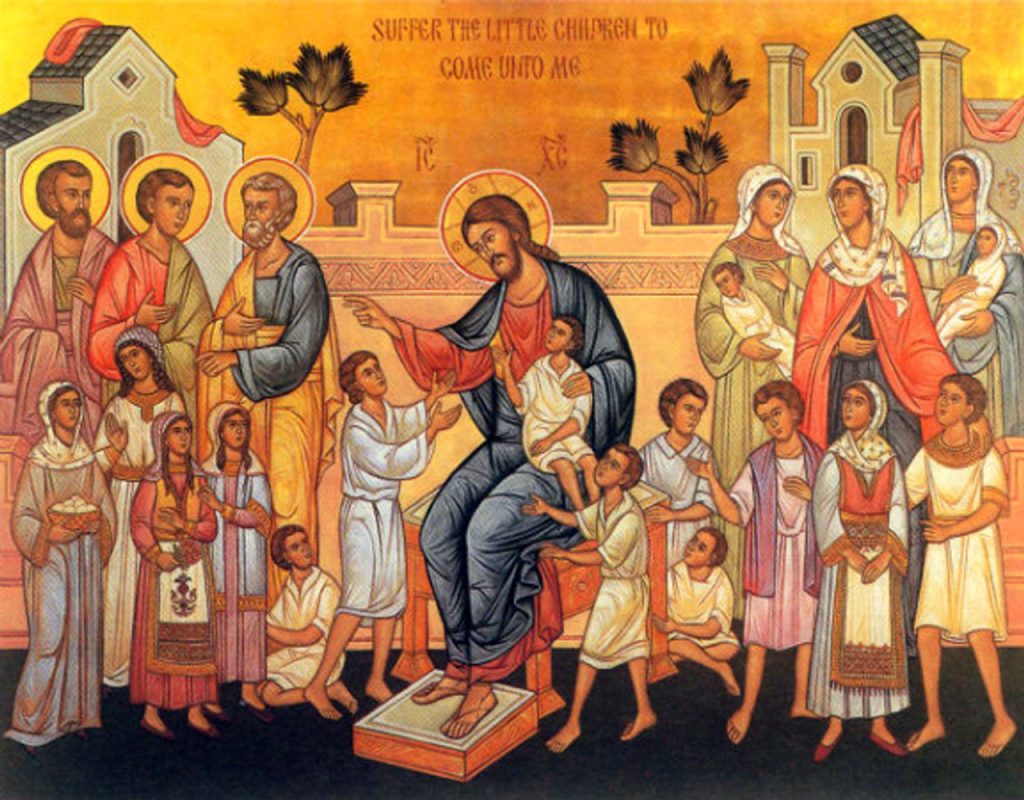
October 6, 2024; Mark 10:13 – 16; 27th Sunday in Ordinary Time
In today’s Gospel, Jesus blesses children. All of us have seen artistic representations of this scene. They hang in nurseries throughout the world. They tell us that Jesus cares for and loves children. So far so good.
But there is more. Because if we situate this passage in the historical context of Jesus’ ministry, there is another, and perhaps, a more important meaning to discover within it. Our culture exults children. Loving them, caring them, protecting them, is central to our families and to our society. And rightly so. But the same was not true in Jesus’ time. Children in the ancient world were viewed as secondary, at best. Now I’m sure that parents of that time loved their children. But until the age of maturity, a child had no legal status. It lacked full personhood. This is why the disciples in the gospel try to keep the children away. They judge that children are not worthy of Jesus’ time. But Jesus welcomes the children and blesses them.
Children in this story represent the marginalized members of society, those who others would dismiss or ignore. They stand for the lowly, the poor, the outcasts. And Jesus tells his disciples that the kingdom of God belongs to them. What Jesus is trying to tell us is that if we wish to enter God’s kingdom, if we wish to stand in God’s love, we must give ourselves to the marginalized. We must serve the least among us. This is central to Jesus’ teaching, and it has immediate consequences in the way we make decisions today. You see, we want to associate with the best people, the most attractive people, but Jesus asks us to give ourselves to those who are rejected and in need. We readily give ourselves to people we like, people we admire, but Jesus asks us to serve the weak and the broken.
I’m sure parents love all their children, but it is the time that a parent spends with the most fragile child, with the most insecure child, that Jesus blesses in a special way. It is a wonderful thing to have friends and hang with them at school, but it is the kindness we show to the student who has no friends or who is ridiculed that makes it clear that we are followers of Jesus. It is a valuable thing to love the people that are close to us. But it’s when we give ourselves in service to those who are not close to us, even those that we do not particularly like, that we reveal that we understand the heart of Jesus’ message.
Jesus calls us to serve the marginalized, to give ourselves to those who others avoid or ignore. When we do that, we show ourselves to be his disciples. When we do that, we prove ourselves worthy of the kingdom of God.

Good thoughts here, Fr.George. Thank you for situating this scripture within the cultural context. Jesus was so far ahead and outside of his cultural norms; maybe ours too.We can all take a page.
The Kingdom of God is both the present reality around us and a vision of what we hope for in the future.
Well, I thought today in the gorgeous fall color and cloud formation was, for me, great beauty. Happy to help in the work to sustain environmental beauty for children’s future to enjoy.
I remember.